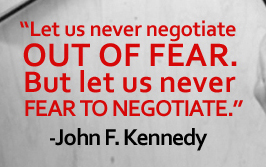Lose A Few Battles, But Still Win The War
By Lori A. Grover, NCPM
You Know How Negotiating Works, You’ve Been Doing It For Years
 Negotiating is a big part of our lives and from an early age we learn that negotiating can help us get what we want or at least come a little closer to it. Taking on extra chores in exchange for a new toy or getting to stay up past our usual bedtime is often our introduction to negotiating with others in order to get what we want. As we grow older and move into the adult world our ability to negotiate successfully has a more direct, tangible impact on our lives, for example, getting a pay raise we feel we deserve or a better deal on a new car.
Negotiating is a big part of our lives and from an early age we learn that negotiating can help us get what we want or at least come a little closer to it. Taking on extra chores in exchange for a new toy or getting to stay up past our usual bedtime is often our introduction to negotiating with others in order to get what we want. As we grow older and move into the adult world our ability to negotiate successfully has a more direct, tangible impact on our lives, for example, getting a pay raise we feel we deserve or a better deal on a new car.
As adults we enter into negotiations knowing there are only three possible outcomes: we get what we want, we don’t get what we want or what’s more likely, we compromise and end up somewhere in the middle. But whatever the outcome, we understand this is part of how life and relationships work. But during a divorce however, the couple actually sitting down and negotiating with each other is often stigmatized or even ridiculed and is viewed by many both inside and outside of the legal system as a losing proposition rather than a sensible way for them to resolve their divorce related problems and arrive a solution they both can live with.
How The Divorce Conflict Cycle Begins
So why is it we feel empowered and proud when we successfully negotiate a compromise, a price between what we wanted to pay for that new car versus the price the salesman quoted us for example, but we become bitter and resentful if we have to compromise when settling our divorce? Well, it’s for two reasons that are as simple as they are complex and neither of which our legal system can be expected to care about as much as you do no matter how badly you wish it would – your feelings and your pride.
Too many people seeking a divorce are, for many reasons and wishful thinking is one of them, conditioned to believe that their legal authority – their lawyer – will get them everything they want but once settlement negotiations begin they learn it’s not that simple and they find they have to compromise. Anger and frustration as a result of their disappointment fires up their emotional state and bruises their pride, which now clouds their judgment and makes them less willing to compromise. In instances like this compromise becomes synonymous with “losing” and obviously, nobody likes to lose.
What I see as a mediator, however, is that a couple who can keep their emotions and pride in check during the negotiation process will almost always arrive at a fair and equitable divorce settlement. They understand that their ability to negotiate successfully is their most valuable asset.
A Lack Of Communication Costs More Than You Think
Much of the negativity that exists surrounding negotiating a divorce settlement is the byproduct of a legal system that profits from and perpetuates conflict. Many matrimonial attorneys discourage their clients from negotiating or even talking with their spouses and most frown on the use of divorce mediation especially, but the irony is that every day, in every state, they themselves negotiate fully expecting to make concessions to the other side in order to settle a case. Why the legal industry has gone to great lengths downplaying and even advising against lawyer-free negotiations is no secret. You may of course draw your own conclusions…
What many divorcing couples don’t realize is that their ability to solve their own problems isn’t any different than an attorney’s, in fact, it’s probably better. What is different, however, is that attorneys have no emotional or financial connection to the circumstances or the outcome, which matters enormously. Many times during an initial consultation I’m asked, “what happens if we can’t agree?” and I respond to them all with the same honest, factual answer: “One way or another you’re going to have to compromise to settle, the only difference is whether it’ll be on your terms or the terms of a lawyer or judge“.
If You Don’t Want A Bloodbath, Don’t Hire A Gladiator
The legal profession many, many years ago inherited the task of divorce settlement negotiations and consequently it’s become ingrained in our legal system as a very profitable battle in an arena they claim only they should fight – despite the devastation, expense and emotional chaos the litigative approach frequently creates for these soon-to-be-broken families. Rather than encouraging divorcing couples to communicate sensibly and rationally to reduce conflict and the awful effect it has on themselves and their children they discourage it because it’s in their own professional and financial best interests. That may sound cynical but it happens all the time.
They claim it’s because they know the law but what’s closer to the truth is that they know how “the system” works and what judges will and won’t allow and that you won’t find written in any legal statutes. Negotiation of a divorce settlement is not something strictly reserved for lawyers or even mediators and if a divorcing couple respectfully and amicably negotiates on their own it’s not a weakness, it shows strength. It’s a way for them work on solving the problems and closing the inevitable financial gaps that exist in almost every divorce settlement. Every couple who recognizes this and chooses to negotiate rather than launch a protracted, expensive and unpredictable legal assault will have a much easier time of it and a far better outcome.



